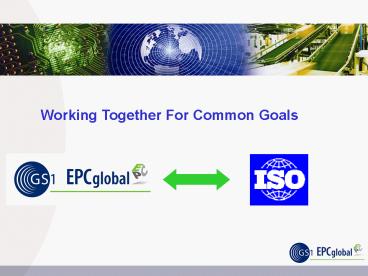EPCglobal and ISO - PowerPoint PPT Presentation
1 / 22
Title:
EPCglobal and ISO
Description:
EPCglobal's Intellectual Property policy is intended to deliver standards that are royalty-free ... will offer their patents royalty free or on a RAND basis ... – PowerPoint PPT presentation
Number of Views:21
Avg rating:3.0/5.0
Title: EPCglobal and ISO
1
Working Together For Common Goals
2
International Organisation for Standardisation -
ISO
- ISO publishes standards in many areas. A few
figures - 156 member national standards bodies such as
ANSI, BSI, DIN, AENOR, JISC, etc. - 2,959 technical bodies (Technical Committees,
Working groups, etc) - 15,649 International Standards published
- 4,009 work items in progress
3
Why should we go to ISO?
- ISO deliverables have a status of de jure
standards in many countries and organisations - Membership of the WTO requires support of ISO
standards in that country - ISO reference is important to EPCglobal adoption
by governmental organisations and by sectors such
as Defence, Airlines, Industrial goods,
Automotive, etc. - The most relevant ISO group for EPCglobal is
ISO/IEC JTC 1/SC31
4
ISO/IEC JTC 1/SC31
- JTC 1 is jointly sponsored by the International
Organisation for Standardisation (ISO) and the
International Electrotechnical Commission (IEC). - SC31 is a Subcommittee of Joint Technical
Committee 1 (JTC 1) on Information Technology.
5
Scope of SC31
- Standardisation of
- data formats
- data syntax
- data structures
- data encoding
- technologies for the process of
- automatic identification
- data capture
6
SC31 structure
- 27 Participating countries 10 Observer
countries - 38 ISO / IEC standards published so
far - 50 Active Projects
7
SC13 RFID basic model
INTERROGATOR
RF TAG
APPLICATION
Tag Physical Memory
Decoder
AIR INTERFACE
Logical Memory Map
Encoder
APPLICATIONCOMMANDS
COMMANDS
Tag Driver and Mapping Rules
Command / Response Unit
RESPONSES
APPLICATIONRESPONSES
Logical Memory
PHYSICAL INTERROGATOR
DATA PROTOCOL PROCESSOR
ISO/IEC 15961
ISO/IEC 18000
ISO/IEC 15962
ISO/IEC 15962 Annexes
8
Combining Data Protocol Sensors
9
ISO/IEC 18000 Air Interface specifications
- 18000-1 General guidelines
- 18000-2 less than 135 KHz
- 18000-3 HF 13.56 MHz
- 18000-4 2.45 GHz
- 18000-6 UHF 860-960 MHz (including Gen 2)
- 18000-7 433 MHz
10
ISO/IEC Software/Middleware
- ISO/IEC 24791 Information technology
- Automatic identification and data capture
techniques - Radio Frequency Identification (RFID) for item
management - Software system infrastructure
- Part 1 Architecture
- Part 2 Data Management
- Part 3 Device Management
- Part 4 Application interface
- Part 5 Device interface
- Part 6 Security
11
ISO/IEC Implementation guidelines
- ISO/IEC 24729-1
- Part 1 RFID-enabled labels and packaging
- ISO/IEC 24729-2
- Part 2 Recyclability of RF tags
- ISO/IEC 24729-3
- Part 3 RFID interrogator / antenna installation
12
Cooperation
13
Collaboration Principle
EPCglobal is committed to collaborate with ISO in
areas where the collaboration benefits its members
14
EPCglobal Standard Process
- Requirements. Users participate in working groups
to develop use cases for applying the technology - Development. Hardware and Software working groups
develop a change to standards or a new one - Ratification. The EPCglobal Board ratifies
standards when they get evidence that the
requirements have been met and that due process
has been followed
15
Working Structure
Industry Action Groups
No Opt-In/ IP
Joint Working Groups
Opt-In/ IP
No Opt-In/ IP
Pilot Implementation
Technical Action Groups
Adoption Programmes
Opt-In/ IP
16
EPCglobal Development Overview
Standards Track
17
ISO Standard Process
- Country reps in ISO technical bodies are
appointed by rules set at the discretion of each
ISO member country. ISO liaison organisations
such as GS1 can participate actively in the work
but dont have voting rights. - Proposal for a new standard or for modifying an
existing standard is submitted by a country or a
liaison body - Documents progress from working draft to ultimate
status of formal standard. Each step includes a
formal ballot by the country members of the
technical body
18
EPCglobal Intellectual Property
- EPCglobals Intellectual Property policy is
intended to deliver standards that are
royalty-free - The policy provides for exceptional situations
where royalties might apply on a Reasonable And
Non-Discriminatory (RAND) basis - EPCglobal subscribers sign an IP policy and then
explicitly state their intention to participate
in a specific Working Group by signing an opt-in
form
19
ISO Intellectual Property
- The ISO policy on Intellectual Property invites
companies potentially impacted by a standard to
declare if they will offer their patents royalty
free or on a RAND basis - Patents included in ISO standards are usually
RAND
20
EPCglobal SC31 cooperation
- A process is under development to enable the
exchange of relevant documents between EPCglobal
and ISO working groups that have similar
objectives - An ad-hoc coordinating committee is being set up
to monitor the work programme and collaboration
opportunities between EPCglobal and SC31
21
???? Questions?
Ian Robertson1 832 283 1790irobertson_at_epcglobal
inc.org
22
Thank YouQuestions ?
Ian Robertson1 832 283 1790irobertson_at_epcglobal
inc.org































